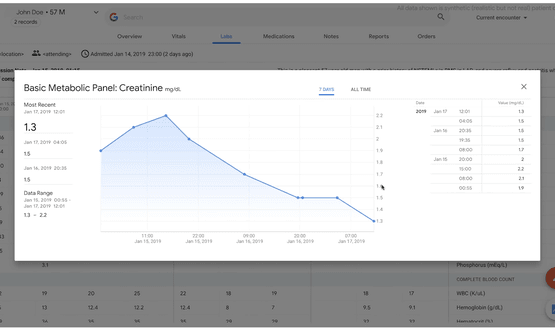Google Health is working on a clinical dashboard capable of pulling data from various clinical systems into a unified interface.
The as-yet-unnamed product provides a single login through which doctors can access a unified view of data that would normally spread across different systems.
This includes vitals, labs, medications and notes, as well as scanned documents and faxes.
Rather than a fully-fledged EPR system – which Google representatives have previously suggested the company is not interested in – the demo hints towards an interoperable platform that sits on top of the clinical desktop.
Doctors can search for keywords and use clinical shorthand to find results. For example, searching “abx” would return mentions of antibiotics in the results, including any medications administered.
The system also uses “a variety of Google technologies” – such as those lifted from its autocomplete and autocorrect functionalities – so that misspelled terms that are not identical matches to the searched-for term show up in results.
Clicking on any value will begin a deeper exploration showing recent and historical trends in graphs and tables, explained Alvin Rajkomar, Google product manager and practicing clinician, in a video demo.
Key admission notes can also be accessed, with the tool using the ‘Smart Compose’ feature from Gmail to autocomplete common clinical phrases. This means that, as clinicians type in different sections of the note, relevant information will be displayed and terms that are difficult to spell are automatically suggested.
The product is currently in development and early clinical pilots.
It comes on the back of revelations that Google is working with US healthcare system Ascension on a project dubbed ‘Nightingale’, which sees authorised Google employees given access to limited patient data.
The project has attracted criticism from privacy advocates and members of the public, as well as a number of Google employees working on the project.
In a blog post responding to the concerns, David Feinberg, head of Google Health, said its work around patient health records “adheres to strict regulations on handling patient data”.
“Our Business Associate Agreement with Ascension ensures their patient data cannot be used for any other purpose than for providing our services – this means it’s never used for advertising,” Feinberg added.
Feinberg also claimed Google’s system was developed and tested on made-up data and openly-available datasets, while Google staff who handle data additionally undergo HIPAA (Health Insurance Portability and Accountability Act) and medical ethics training.
Google’s protocols are also subject to external certification processes, whereby third-party auditors assess the company’s security compliance standards.
“Health information is incredibly complex – there are misspellings, different ways of saying the same thing, handwritten scribbles, and faxes. Healthcare IT systems also don’t talk well to each other and this keeps doctors and nurses from taking the best possible care of you,” Feinberg said in the post.
“Policymakers and regulators across the world (e.g., CMS, HHS, the NHS, and EC) have called this out as an important issue. We’ve committed to help, and it’s why we built this system on interoperable standards.
“To deliver such a tool to providers, the system must operate on patients’ records. This is what people have been asking about in the context of our Ascension partnership, and why we want to clarify how we handle that data.”


29 November 2019 @ 19:26
Thank you Google, progress, Google analytics and approach to data is awesome, the best on the market. I sometimes think if Google were managing the EHR at the national level, we would all, all of us be so much better off. You can not have a service that, from a data perspective, is so uneven and the NHS is. I am aware some politicians (NHS and party) are not great fans of Google but I think the vast majority of real PEOPLE are. ThanX.
28 November 2019 @ 17:13
I look forward to seeing the clinical safety documentation for this.
27 November 2019 @ 20:43
We already have an excellent health care portal particularly for patients and clinicians. It’s called ‘Patients Know Best’ – Care Information Exchange., already in use in North West London. I haven’t as yet come across anything superior to it, especially as the patient is kept informed. Come back again when you actually involve patients
27 November 2019 @ 12:35
So, the same as the Amalga data aggregation plaform that the Microsoft Health Solutions Group tried to find a market for 10 years ago? What comes around…
29 November 2019 @ 16:19
The Care Information Exchange, running the PKB portal, is indeed excellent. Patients [like me] can originate and therefore communicate a lot of data which is of paramount importance to health care professionals and also to develop co-responsibilities in terms of health and social care. You suggest Google will be blameless the day they provide this patient interaction. Well, I am not so sure! Google have for years garnered so-called behavioural surplus to market predictive products across all economic sectors and developed a whole array of tangible [wearables and other devices] and hidden tools to basically steal personal data points. De facto they have redefined “involvement” whether people want it or not, are aware of it or not. No thanks! I will happily stick to PKB.